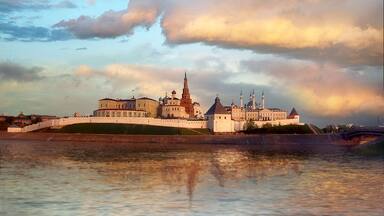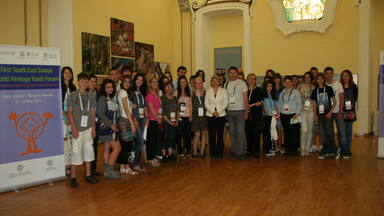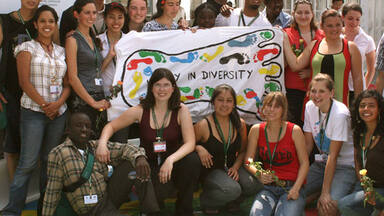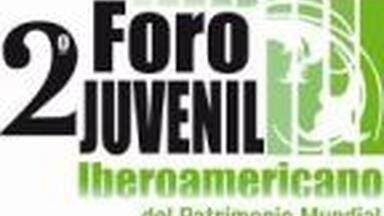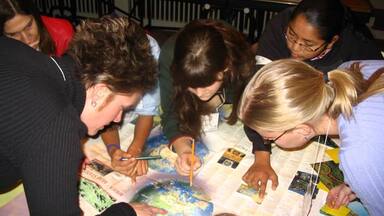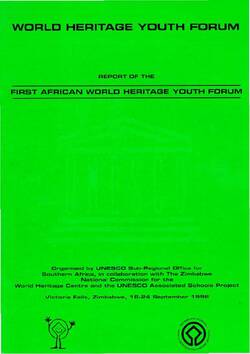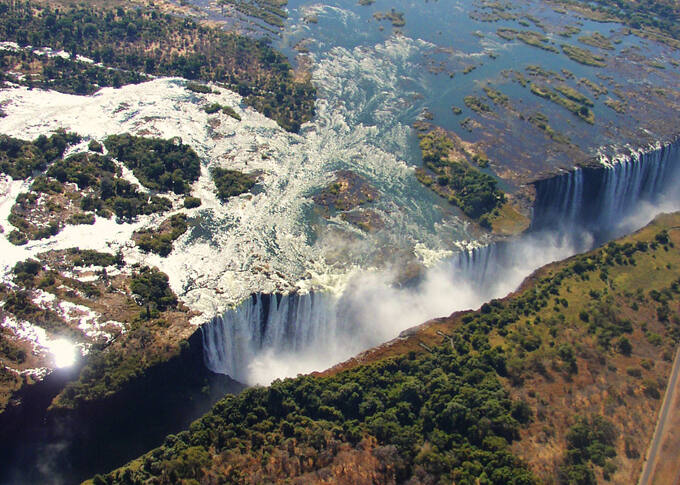
Student's appeal
"We, the youth of Africa, have met at the UNESCO World Heritage Forum for Africa in Zimbabwe (18-24 September 1996). During this week, we have discovered just how important it is to conserve and preserve our heritage. Our appeal to you is to help us carry this heritage into the future. We "Patrimonitos" are defenders of World Heritage and the leaders of the future. We want to spread the great pride we have in our African heritage to all members of our generation. Though we are many, we need your support. We believe that together we can preserve and promote the legacy of our natural and cultural heritage".
The students resolved:
- To involve and educate their communities on the importance of their heritage;
- To introduce in their education at an early stage an awareness of world heritage. They also appealed for help in organizing traditional culture oriented events like workshops and seminars;
- That authorities should be able to control the number of tourists visiting heritage sites, and encourage a respect for their value;
- To restore chiefs' powers.
Patrimonitos participating in the creative writing workshop with Ingvild Grande, Ambrose Tinarwo, Ivan Viden and Seida Tahir, emphasized the importance of the appeal through the following message to their colleagues:
"Words alone cannot help us preserve any cultural or natural heritage sites. We need to take action. Politicians are the ones who decide where and when to build roads, houses and other infrastructure. The entire development of our society is in their hands. If they seem to forget about the importance of preserving and caring for the environment, we, the Patrimonies, can remind them of the fact through writing an appeal for co-operation from local and central government. By this means we can directly influence the preservation of our heritage."
Teacher's recommandation
All the teachers who attended the first ASP/WHC African World Heritage Youth Forum mindful of the following quotes:
"When an old man dies a whole library burns down"
"World Heritage is a treasure for life"
"A country without heritage has no future"
resolved to:
- Actively support and participate in the UNESCO ASP/WHC World Heritage Youth Project.
- Commit themselves to the ideals of identifying, protecting, preserving and promoting World Heritage Sites and Monuments for prosperity and overall benefit.
The teachers discussed various techniques for incorporating World Heritage Education into the curriculum. These included multi-disciplinary and integrated approaches using local and familiar examples of World Heritage Sites as teaching contexts with which students could readily identify.
The teachers acknowledged that World Heritage Education is a process beginning with techniques for enhancement of student sensitivity and awareness, learning about the World Heritage Convention and fieldwork planning. Examples were given of project and exploration based teaching approaches perhaps involving student choice to enhance their involvement and "ownership" of their work. Discussions were held on techniques that would help clarify the values of parties in World Heritage issues such as tourism and development.
World Heritage Education is an entry point that gives students the attitudes, knowledge and skills to empower them to play a more active role in preserving heritage in their own communities.
In particular the discussions concentrated on the following aspects of the Kit:
The Convention
The teachers agreed that teaching about the World Heritage Convention starts with sensitizing students to their local, national and regional (African) heritage and gradually widening the perspective to the global (World) heritage. Through studying and visiting local sites basic knowledge of the Convention may be introduced:
- the World Heritage List;
- the World Heritage Committee;
- the World Heritage Fund;
- and challenges facing nations and peoples of the world in implementing this international legal instrument.
The judicial aspects of the Convention must be underlined and related to local management and national laws. An essential objective of teaching about the World Heritage Convention is to promote students' ability to assess the value of the local as well as their global heritage. It was only necessary to adopt the Convention because of humankind's inability to preserve their heritage. Considering the serious threats facing the World's Heritage it is vital to make young people work to preserve heritage. Teaching students about the criteria for nominating and then playing sites on the lists enables them to appreciate the unique qualities of the sites.
- Identity
It was agreed that an understanding of identity is crucial to World Heritage Education. Only through identification with and understanding of the cultural aspects of their background can students develop respect for and commitment to their heritage - cultural as well as natural. The keyword is "belonging". By respecting their traditional cultural values students will work to preserve their heritage and appreciate the heritage of others. Teaching World Heritage and identity includes site visits that concentrate on social, religious, indigenous, historical and political topics and inviting resource persons (elders) to the school and documenting their stories. - Tourism
Tourism is an important and essential part of the world economy and of the economies of all of the countries. However, tourism frequently exploits local people and often misrepresents the very culture that it claims to be explaining while at the same time it often contributes to the deterioration of both natural and cultural sites. Authorities responsible for the development of tourism should work closely with local communities and promote responsible sustainable tourism that will lead to better mutual understanding and to the long term protection of the world's natural and cultural heritage. Tourism venues and businesses should also work with local schools to enable students to visit and learn more about their natural and cultural heritage. For example, sites could give free or reduced admission to educational groups and provide interesting and suitable information and literature; students could produce written information about sites; local businesses could sponsor transport for visiting sites and museums and allow schools access to computer technology including the Internet; and local and national media could offer air time for covering heritage education. - Culture of Peace
The teachers regarded this as an important topic for. World Heritage Education and students should be reminded of the Preamble of the UNESCO Constitution, which reads: "Since wars begin in the minds of men, it is in the minds of men that the defenses of peace must be constructed".
Students should be invited to define and discuss what peace means to them. In order to establish the relationship between peace and World Heritage, teachers could show posters or videos of World Heritage sites representing peace/war or tragic historical events (e.g. Goree Islands, Senegal) as well as the impact of war on World Heritage sites (e.g. Dubrovnik, Croatia). Students should conduct research on peace related issues such as the relationship between humankind and nature. - Environment
All students should be aware of extracts from Agenda 21 (a major recommendation from the United Nations 1992 Rio Earth Summit) in order that they may learn more about the critical issues facing World Heritage Sites - especially natural sites.
Human impact on the environment has become so great, and damaging, that all students must be sensitized to the potentially catastrophic nature of this threat. As a species human beings seem to have lost the understanding of the inter-relationship between people and nature; that man cannot exist without taking care of the natural environment. For example, students should study the impact of water/air/soil pollution and the "greenhouse effect".
Students should develop these ideas in a number of ways including identifying natural World Heritage Sites on a map, puzzles, debates, quizzes, poems and art work. Furthermore, students could assist in awareness campaigns reaching out to the general public. - Sites and Museums
The idea of visiting sites and museums as part of the school curriculum is of enormous value. This should not be put off by the common lack of financial resources every effort must be put to raise funds to enable site and museum visits to take place.
It is by actually visiting sites and museums, seeing the real physical remains of the past at first hand, that students begin to understand the value of preserving their natural and cultural heritage and begin to accept the responsibility for doing so.
In Africa, heritage is concerned not only with physical remains but also with the beliefs and traditions of the ancestors and communities. These beliefs and traditions are unique to Africa and they have significance for all people as they move into the next millennium.
Those responsible for the natural and cultural heritage should accept the extra responsibility of providing information and interpretation for students, linked wherever possible to curriculum subjects in order to help and encourage the educational use of museums and sites.
Site managers, teachers and students should work together and form an irresistible force for the protection of heritage. The teachers agreed to follow up the students after visits to sites and museums in the classrooms and in extra-curricula activities. - Role-play
Role-play and simulation are useful approaches for teaching World Heritage. These include peaceful resolution, reviving the past, within a site setting, dramatizing literature and students' texts. The teachers also proposed an African example to be included in which dancing, singing and telling stories provide an alternative to a role-play with a dialogue. - Resource material
It was agreed that the Kit should contain the World Heritage Map, a brief description of all sites, the list of properties included in the World Heritage List, the dates of State Parties, laminated photos of World Heritage Sites, transparencies and posters concerning the issues of World Heritage Protection. It was also suggested that the Kit should contain promotional material such as mugs, badges, World Heritage stickers, pins, T-shirts and caps, It was also proposed that UNESCO should produce and send Patrimonito T-shirts to all participants so that they can be used as a prototype and be reproduced locally/nationally for the World Heritage Education Project.
Strategy
The teachers agreed that the main challenge was to introduce and incorporate World Heritage Education at all levels in all schools, for all students around the world. For Africa, the teachers envisaged the following strategies to be implemented within both formal and non-formal education in order to reach this ambitious and long-term objective:
- On a short term basis
to encourage teachers to use an integrated approach across a range of subjects under the single theme or context of World Heritage;
to sensitize schools by wearing World Heritage T-shirts and badges, etc. and use the network to consolidate the place of World Heritage Education in formal and non-formal education. - On a medium term basis
to create national and sub-regional World Heritage Education task forces including teachers, curriculum developers, teacher training colleges and ministries;
to develop educational packages on individual sites by students;to promote adoption of sites by schools;
to sensitize site and museum guides, parents, local communities and developers to the importance of preserving World Heritage; and
to promote the monitoring of World Heritage Education through mobile teaching teams which can help extend World Heritage Education to other schools. - On a long term basis
to ensure the inclusion of World Heritage Education in all formal curricula and examinations;
to ensure the inclusion of World Heritage Education in as many aspects of non-formal education as possible.
Recommendations
The teachers recommended:
National Level
- that all teachers present at the Forum report back on the results and conclusions of the Forum to their schools, local communities, local and national television and/or radio, UNESCO National Commission and relevant Ministries.
The identification of a national focal person for the World Heritage Youth Project who should: - identify Associated schools to take part in the project;
- provide technical assistance to school projects;
- provide reports and/or newsletters, nationally/sub-regionally/regionally;
- identify pilot project schools to test the UNESCO World Heritage Education Kit;
The organization of national workshops on ASP and the World Heritage Youth Project to:
- organize visits to sites or places of special interest;
- adopt sites in close co-operation with site managers;
- organize National World Heritage Youth Fora;
- organize national competitions for the development of World Heritage posters.
Regional Level
- The organization of World Heritage quiz contests by UNESCO National Commissions through sub-regions (the first prize of which could be travel to a World Heritage site in a neighboring country);
- the development of an African World Heritage calendar;
- the preparation and production of teaching materials on the countries' exceptional places of interest;
- the production of notebooks, writing pads, pencils etc. with slogans such as "Protect our World Heritage" or "World Heritage is a treasure for life".
International Level
- UNESCO to produce stickers or other promotional material in order to raise money for school projects;
- UNESCO to produce World Heritage games based on the idea of snakes and ladders.
Summary Report
In an effort to create awareness among youth, diffuse information about World Heritage preservation and promotion in Africa and provide input into the World Heritage Education KIT, the First African World Heritage Youth Forum for English speaking countries was organized in Victoria Falls, Zimbabwe in 18-24 September 1996. The Victoria Falls Forum is the second regional Youth Forum held in the context of the UNESCO interregional project on World Heritage Education.
The Forum was conducted in plenary, workshops and study tours. In plenary and workshops, students and teachers learned and discussed the concepts of WHE, the WH Convention and how the ASP network is being used to implement the project. They were also introduced to the criteria used in selecting a site for the World Heritage List and what it entails to be on that list. A corss-section of the site on the List was shown to illustrate the tremendous diversity of the World Heritage.
Creative workshops for teachers and students were conducted in parallel sessions. To acquire deeper understanding and knowledge of certain aspects of heritage, participants chose among various creative workshops: sculpture, journalism, environmental impact assessment, cultural landscape/music, restoration/conservation.
Victoria Falls offered the appropriate natural heritage elements. The Forum was unique in that it provided both natural and cultural aspects. The cultural aspects emerged particularly from the visit to Livingstone in Zambia.
There was consensus among the participants that there was need to preserve and promote the natural and cultural heritage. It was observed that Africa had a lot to offer in terms of natural and cultural heritage. A recommendation was made to the effect that World Heritage holiday camps be held at local national or World Heritage sites.
Participants were inspired to put their efforts towards the success of the Forum by the presence of senior UNESCO officials. The presence of the UNESCO Director-General, Professor Federico Mayor at the opening ceremony showed the importance attached to World Heritage education by the organization.
Participants
70 participants, of which 48 students, 23 teachers, 11 UNESCO representatives, 11 resource persons
Countries represented
Ethiopia, Gambia, Ghana, Kenya, Lesotho, Madagascar, Malawi, Mozambique, Mauritius, Namibia, Nigeria, Sierra Leone, Swaziland, Seychelles, Uganda, Zambia, Zimbabwe, Croatia, Norway, New Zealand.
Organizers
UNESCO Sub-regional Office for Southern Africa
The Zimbabwe National Commission for UNESCO
World Heritage Centre
The UNESCO Associated Schools Project
Partners
Norwegian National Commission for UNESCO
Nordic World Heritage Office
Rhône Poulenc Foundation
The Norwegian Agency for Development Cooperation
Collaborators
Zimbabwe National Museums and Monuments
Museum of Human Sciences of Zimbabwe
English Heritage
Mosi-oa-Tunya High School
